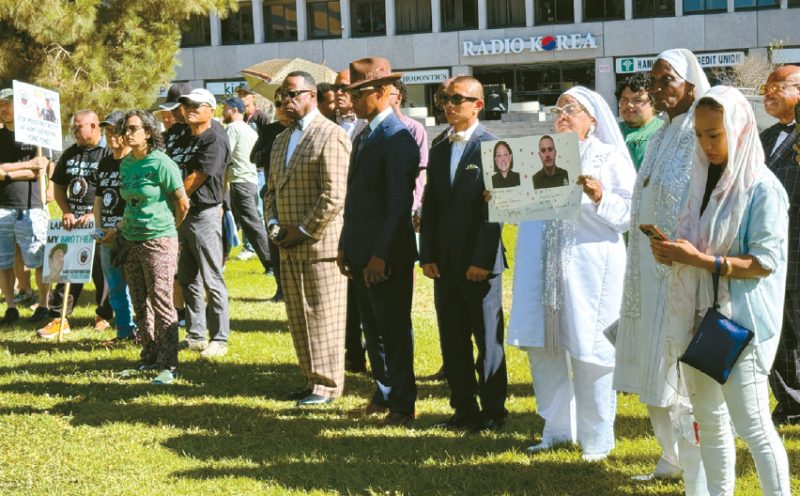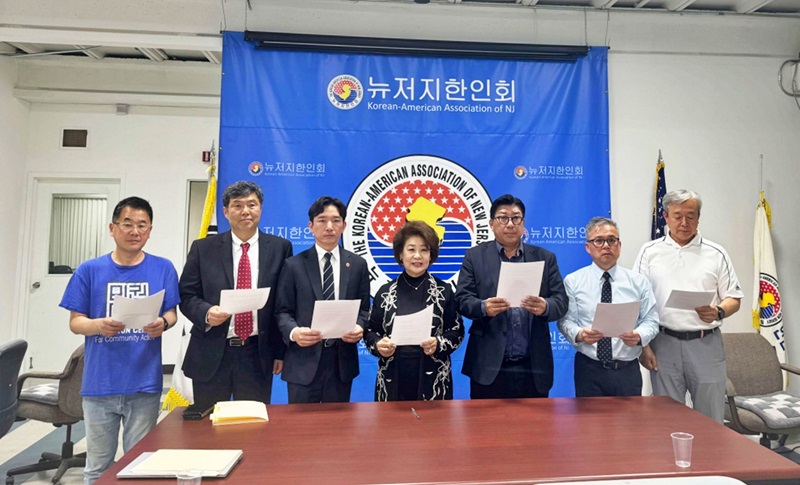The Korean-American community in New Jersey did not remain silent. They were outraged, and their voices of condemnation followed. This is the story of Victoria Lee, 25, who was fatally shot by police in Fort Lee, New Jersey, on July 28.
This incident bears many similarities to the case of Yong Yang, who was fatally shot by police in Los Angeles on May 2. Lee also suffered from mental illness. As her condition worsened, her family reached out to authorities for help. But instead of paramedics, Lee was confronted by the police.
Upon hearing that the police were coming, Lee, gripped by anxiety, held a knife. Her family, aware of the situation, pleaded with the officers not to approach her. Nevertheless, the officers knocked on the front door more than 10 times, further agitating Lee. Despite these circumstances, the officers broke down the door and entered.
Lee was holding a knife in her left hand and a water bottle in her right. When she, trembling with fear, approached the officers, the police officers fired without hesitation. Lee was not a criminal. She was a patient suffering from a mental illness. Yet the police treated her like a criminal, and another life was extinguished by their bullets.

In response to the controversy surrounding their excessive force, the police offered only a generic statement. They released body camera footage, stating that they had acted according to protocol and that an investigation was ongoing. But could the Korean-American community in New Jersey truly not understand the police’s response guidelines? Of course not. They were outraged by the indiscriminate application of these procedures to an innocent citizen.
In the aftermath, numerous Korean-American organizations, including the Korean American Association of New Jersey, KCC, and the MinKwon Center for Community Action, quickly held a press conference calling for a thorough investigation. Once the Korean-American community mobilized, several Asian Pacific American organizations and mainstream institutions began to lend their voices.
Eventually, leaders from various minority groups, including Korean-American organizations, gathered at the lawn of the Fort Lee Community Center, near where the incident occurred. Together, they demanded a review of police procedures for dealing with individuals suffering from mental health issues, insisting that no more unjust deaths should occur.
One notable difference between Victoria Lee and Yong Yang is their citizenship status. Yang was a permanent resident, while Lee was a U.S. citizen.
Nevertheless, Eui-hwan Kim, the Consul General of South Korea in New York, requested that the U.S. Attorney’s Office conduct a swift and fair investigation.
Kim also met with Fort Lee Mayor Mark Sokolich, urging him to work on improving the system in light of Lee’s case. Despite the potential for misunderstanding regarding South Korea’s involvement, Kim emphasized that more than 60% of Korean Americans in the U.S. are U.S. citizens.
“We approached this from a humanitarian perspective, beyond national concerns. If I can’t even send a letter, why am I serving as Consul General?” Kim stated, urging for a united response from the Korean-American communities in New York and New Jersey.

As public pressure intensified, New Jersey’s Attorney General announced a new protocol for dealing with individuals suffering from mental illness. Righteous anger had, in the end, led to change.
What about the Korean-American community in Los Angeles? During the protests condemning the wrongful death of Yong Yang, not a single leader from a Korean American organization or politician made an appearance. Even though Yang was a permanent resident of South Korea, no representatives from the consulate were present.
Politicians who often seek out the Korean American community during election season—such as LA City Councilman John Lee, U.S. Representative Michelle Park Steel (45th District), and U.S. Representative Young Kim (40th District)—issued no official statements. One former leader of a Korean-American organization even remarked that it wouldn’t be wise to impose a heavy burden on Dominic Choi, the interim chief of the LAPD, because he is Korean-American.
Tragedies stemming from the misuse of law enforcement power continue. The issue is not simply that the victims are Korean Americans. Their deaths must serve as a catalyst to raise voices and demand changes to a broken system to prevent future unjust sacrifices.
On September 17, the Los Angeles City Council will hold a moment of silence to honor Yong Yang. His family will speak before the council members and residents about the injustice of their son’s death. The council chamber will be open to all. Even now, it is time to raise voices and step forward. Silence is a cowardly choice.
By Yeol Jang jang.yeol@koreadaily.com

![Korean President Yoon Suk Yeol ousted from office after unanimous Constitutional Court ruling President Yoon Suk Yeol, right, delivers his closing statement at the 11th and final hearing of his impeachment trial at the Constitutional Court in Jongno District, central Seoul, on Feb. 25. [CONSTITUTIONAL COURT]](https://www.koreadailyus.com/wp-content/uploads/2025/04/0403-impeach-100x70.jpg)
![Clovine accelerates global expansion in collaboration platform market Website of Clovine, a cloud-based project management provider [Screenshot]](https://www.koreadailyus.com/wp-content/uploads/2025/04/0403-clovine-100x70.jpg)

![Hangar images indicate North Korean advances in military drone domain Satellite photos taken on March 28, included in Beyond Parallel's report on North Korea, shows what appears to be seven new drone hangars at the Banghyon Air Base. [SCREEN CATPURE]](https://www.koreadailyus.com/wp-content/uploads/2025/04/0402-Hangar-100x70.jpg)